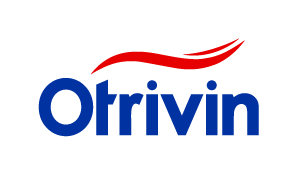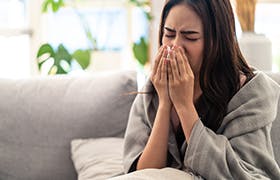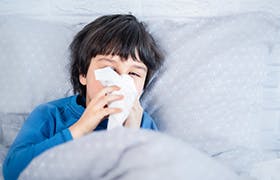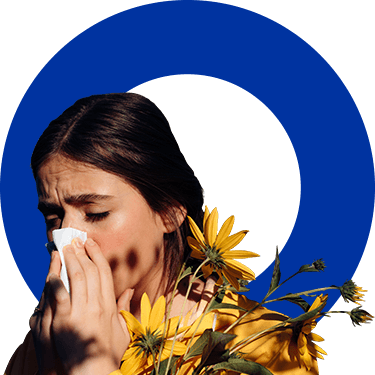
Allergic rhinitis symptoms to look out for:
People with allergic rhinitis can start to experience symptoms just minutes after breathing in an allergy-causing substance (allergen) such as mould spores, dust, pollutants, pet dander or pollen.2 Common symptoms include:2
- Sneezing
- Itchy nose
- Runny nose
- Blocked nose
- Itching of the mouth and throat
- Postnasal drip (mucus running down the back of the throat)
- Watery, red and itchy eyes
If you suffer from allergic rhinitis, you know that it can seriously impact your daily life. Depending on the severity of your symptoms, allergic rhinitis can have psychological effects, interfere with social interactions, and even create an economic impact.1 Let’s explore some of these implications in a bit more detail:1
- Psychological effects: Fatigue, irritability, anxiety, depression, frustration, self-consciousness and lower energy, motivation, alertness, and ability to concentrate, are common
- Sleep disturbances: Nasal congestion is often associated with sleep-disordered breathing. More than half of adults with allergic rhinitis have sleep problems at night due to blocked nose, which can lead to tiredness and difficulty thinking clearly during the day
- Interference with social interaction: Due to avoiding triggers for their allergic rhinitis, some people can experience social isolation, activity limitations, limited visits to friends and family, and an inability to visit open spaces such as parks and closed spaces like restaurants and cinemas
How can I treat the symptoms?
Unfortunately, there’s currently no complete treatment for allergic rhinitis. The good news, however, is that there are some ways to help relieve your symptoms. Treatment options include antihistamines, corticosteroids, nasal decongestants and nasal irrigation:2,3
- Antihistamines help counter the effects of histamine, the chemical released within your body when an allergic reaction takes place. Antihistamines are found in eyedrops, nasal sprays and, most commonly, oral tablets and syrup
- Intranasal corticosteroids can reduce the inflammation of the inside of your nose and significantly reduce nasal congestion as well as sneezing, itching and a runny nose.3,4 In order for you to get the best from intranasal corticosteroids it is recommended that you start using them two weeks before you are first exposed to the particular allergen that causes your allergic rhinitis.
- Nasal Decongestants like Otrivin Moist A and Otrivin Moist P can help to open up blocked nasal passages that have become inflamed as a result of allergic conditions. Otrivin moisturising range also contains additional benefits of sorbitol and hypermellose that further prevents drying and irritation of the nasal passage. Otrivin Moist A and Otrivin Moist P starts to unblock your nose in just 2 minutes and provides relief up to 12 hours. 4,5
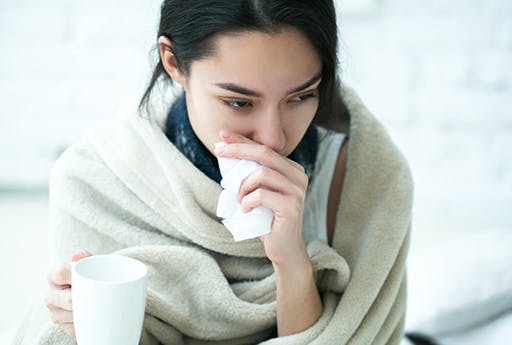
Reach for Otrivin as part of your allergic rhinitis treatment.
Decongestants such as Otrivin (Otrivin Moist A, Otrivin Moist P, Otrivin Oxy FR, Otrivin Paediatric) can help provide fast, long-lasting relief for nasal congestion.6 Nasal congestion is often considered one of the worst symptoms of allergic rhinitis, as it can make the simple act of breathing more difficult.
There are things that people with allergic rhinitis can think about adopting into their routine to manage their symptoms long-term. Your nose is the first line of defence when it comes to airborne allergens – it filters particles from the air you breathe in by trapping them in the mucus and hairs inside the nose. They are then transported to the back of your throat and swallowed or coughed out.
A build-up of pollutants/dust/pollens in the nose can affect this process and here’s where the system can break down, leading to inflammation and a blocked nose.
Additionally, you can also use Otrivin Breathe Clean – a daily nasal wash that can help keep nature’s pollution filter (the nose) working. This gentle saline formula can be used every day to help clear your nose and wash away any trapped allergens from the nose.7
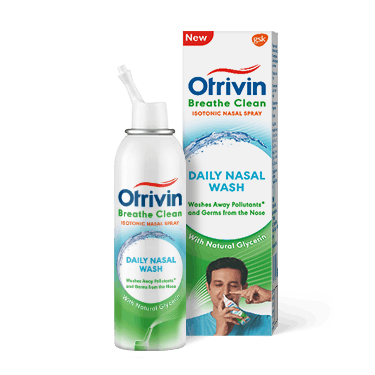
How can I prevent symptoms?
Avoiding the triggers for your specific allergy is also an important part of managing it. It is sometimes possible to prevent allergic rhinitis symptoms by taking precautions such as:2
- Staying indoors when the pollen count/ pollution/dust is high. Avoid going out in months when pollution, dust, and pollen count are high.
- Trying to avoid walking in grassy, open spaces. This is particularly important during the early morning, early evening, and during mowing, when the pollen count is high.
- Keeping windows and doors closed. This would prevent exposure to dust and pollutants.
- Wearing sunglasses or glasses. This is to stop pollen/dust getting in your eyes when you’re outdoors and taking a shower when you get home to remove it from your skin.
- Using a nasal wash. This can help to clean your nostrils of pollutants, pollens and dust.
References:
- World Allergy Organization. 2011-2012 Executive Summary. In WAO White Book on Allergy. Pawankar R, Walkter Canonica G, Holgate ST, et al, eds. 2011:11–20. World Allergy Organisation
- NICE CKS. Allergic rhinitis. Available from https://cks.nice.org.uk/allergic-rhinitis#!backgroundSub:2 (last accessed March 2020)
- American College of Allergy, Asthma and Immunology. Allergic Rhinitis. Available from: https://acaai.org/allergies/types/hay-fever-rhinitis (last accessed March 2020)
- NHS Inform. Hay fever. Available from: https://www.nhsinform.scot/illnesses-and-conditions/immune-system/hay-fever (last accessed March 2020)
- GSK. Xylometazoline hydrochloride Global Datasheet.
- Otrivin Moisturising Adult Product Information leaflet.
- Otrivin Breathe Clean Product Information leaflet.
- Otrivin Moisturising Paediatric Product Information Leaflet.
Show all references
Close references
